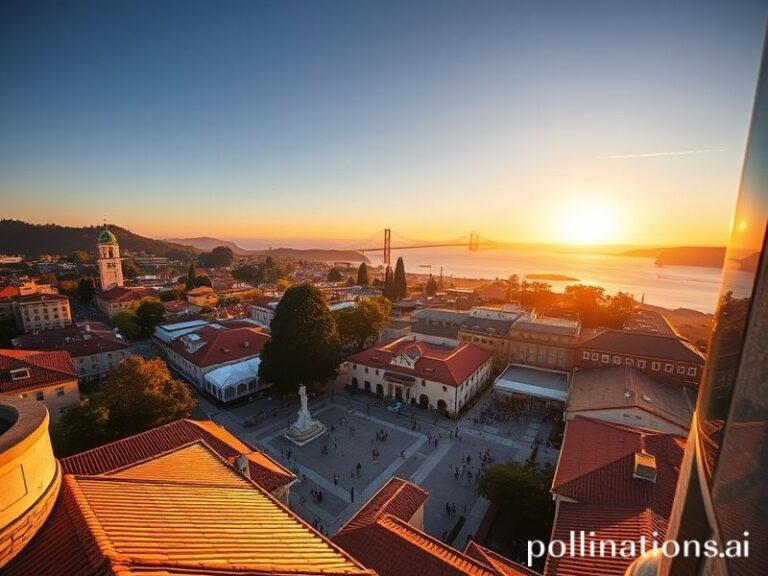Colin Firth: The World’s Favorite Emotional Compression Algorithm
Colin Firth: The Last Englishman the World Still Pretends to Admire
By Elias Moreau, Senior Continental Correspondent
PARIS—Every few years the planet’s streaming algorithms decide we need another reminder that Britain once ruled the waves by giving Colin Firth a new costume and a tragic backstory. From Delhi duplexes to São Paulo sublets, subtitles flicker across his clipped vowels, and for two hours the globe sighs, “Ah, the quiet dignity of repression.” It’s a neat trick: a nation that can’t keep its own lights on still exports the fantasy that emotional constipation is a superpower.
Firth’s career is, in effect, a UNESCO intangible heritage site for repressed desire. Whether he’s dripping into a lake in a wet shirt or staring wistfully at Keira Knightley’s cheekbones, he performs the same geopolitical service as British embassies: a reassuring outpost of civility in places where the Wi-Fi is patchy and the local dictator just banned WhatsApp. His face—equal parts apologetic shrug and mild gastrointestinal discomfort—has become a kind of soft-power Visine for the world’s conjunctivitis.
Consider the numbers: Pride and Prejudice (1995) still airs in 143 territories, making it more widely distributed than polio vaccines. Mamma Mia! (2008) financed half the Greek recovery bond issue, if only by injecting foreign currency into every taverna from Hydra to Halkidiki. And The King’s Speech (2010) allowed American Oscar voters to forgive Britain for the BP oil spill—temporarily—by watching a monarch overcome a speech impediment with the help of an Australian, a plotline so colonially on-brand it might as well come with a side of marmalade.
Yet there is something darker at play beneath the cufflinks and corduroy. In an era when democracies outsource their rage to Twitter and their supply chains to whichever autocrat offers the cheapest lithium, Firth’s brand of stiff-upper-lippery feels less like nostalgia and more like assisted suicide. We watch him suppress another tear and think, “Yes, that’s how civilizations end—not with a bang, but with a politely cleared throat.”
Global audiences adore him precisely because he promises that pain can still be endured in three-quarter time. In Lagos traffic jams, minibus screens loop Love Actually, offering Nigerians a vision of Heathrow where the biggest crisis is a cheating writer and not the Home Office deporting your cousin. In Seoul’s neon insomnia, A Single Man streams at 2 a.m., reassuring overworked salarymen that existential despair can look exquisite in Tom Ford. Meanwhile, Brexit grinds on like a Merchant-Ivory film directed by Kafka, and Firth keeps cashing residual checks denominated in currencies that may not exist by the time the next season drops.
Even his spy turn as Harry Hart in the Kingsman franchise operates as geopolitical satire: a Savile Row suit hiding drone strikes behind a smile that says, “Terribly sorry, old chap, but your village appears to have been collateral-ed.” It’s James Bond for an age when MI6 outsources its wet work to algorithmic trading firms, and the audience cheers because at least someone still wears a tie to do the killing.
And so we arrive, inevitably, at the UN’s newest soft-power metric: the Firth Index. Economists at the OECD quietly track how many times per quarter a nation’s Netflix top-10 features his jawline. When the number spikes, foreign direct investment follows—like moths to a very polite flame. The Italians call it “l’effetto Firth”; the Japanese, “Fāsan no kabe.” Rough translation: the wall of wistful colonial charm against which modern anxieties gently bruise themselves.
Conclusion: Colin Firth is not merely an actor; he is the world’s coping mechanism for late-stage capitalism wearing tweed. He offers the comforting illusion that the empire died of good manners rather than a thousand self-inflicted cuts. And while the planet’s actual overlords meet in Davos to auction off the remaining icebergs, we queue up to watch him almost say “I love you,” then decide against it because the moment has passed. It always has.
In the end, perhaps that is the most international truth of all: we would rather watch a well-dressed man suffer in silence than change the channel and confront the screaming outside our own windows.







